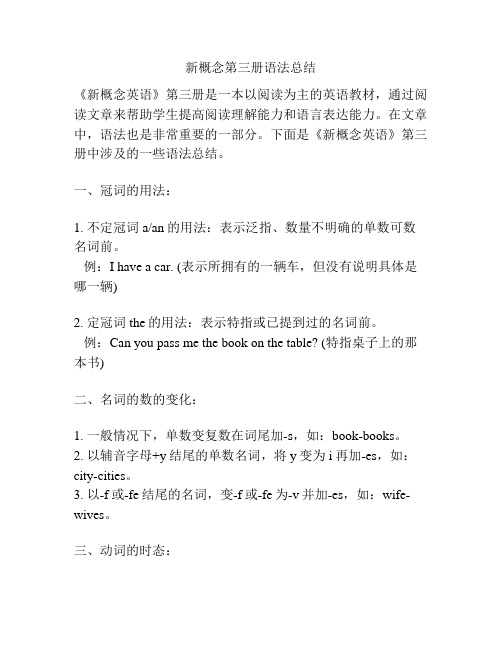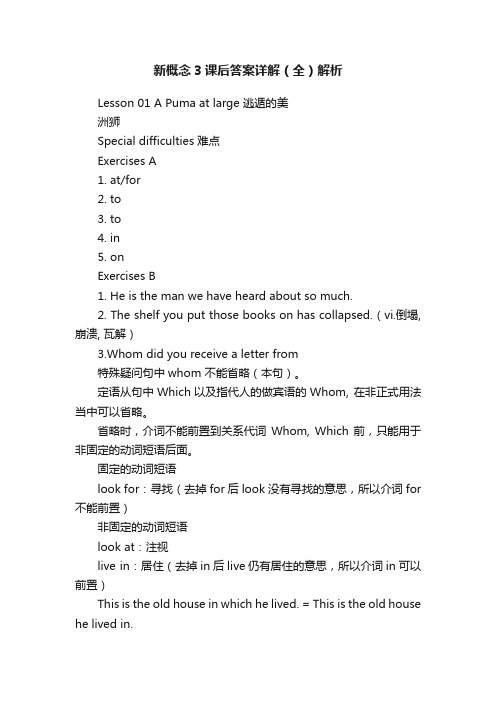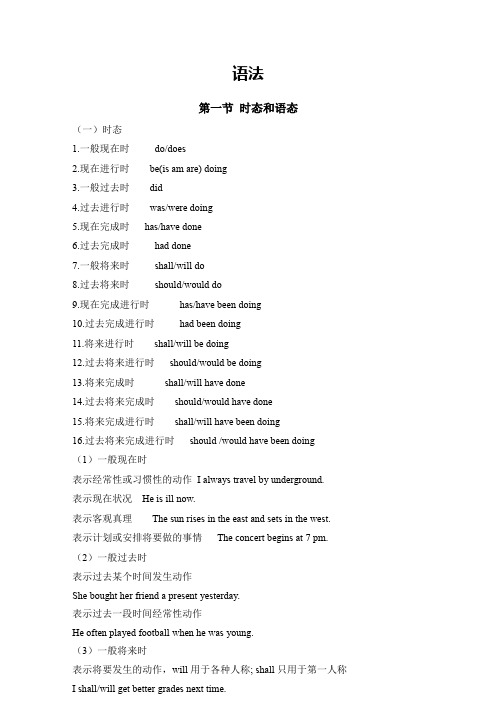学霸英语新概念第三册语法详解和总结(带习题和答案)
新概念第三册语法总结

新概念第三册语法总结《新概念英语》第三册是一本以阅读为主的英语教材,通过阅读文章来帮助学生提高阅读理解能力和语言表达能力。
在文章中,语法也是非常重要的一部分。
下面是《新概念英语》第三册中涉及的一些语法总结。
一、冠词的用法:1. 不定冠词a/an的用法:表示泛指、数量不明确的单数可数名词前。
例:I have a car. (表示所拥有的一辆车,但没有说明具体是哪一辆)2. 定冠词the的用法:表示特指或已提到过的名词前。
例:Can you pass me the book on the table? (特指桌子上的那本书)二、名词的数的变化:1. 一般情况下,单数变复数在词尾加-s,如:book-books。
2. 以辅音字母+y结尾的单数名词,将y变为i再加-es,如:city-cities。
3. 以-f或-fe结尾的名词,变-f或-fe为-v并加-es,如:wife-wives。
三、动词的时态:1. 一般现在时:表示习惯性、经常性或客观真理等。
例:Water boils at 100 degrees Celsius. (客观真理)2. 一般过去时:表示过去发生或存在的动作或状态。
例:She lived in London for five years. (过去发生的动作)3. 现在进行时:表示现在正在进行的动作。
例:I am reading a book now. (正在进行的动作)4. 过去进行时:表示过去某一时间正在进行的动作。
例:He was studying when I called him. (过去某一时间正在进行的动作)5. 一般将来时:表示将来某一时间将要发生的动作。
例:I will go to the cinema tomorrow. (将来某一时间将要发生的动作)四、形容词和副词的比较等级:1. 一般形容词比较等级:例:good - better - best (好 - 更好 - 最好)2. 以-y结尾的形容词,变-y为-i,再加-er或-est:例:happy - happier - happiest (快乐 - 更快乐 - 最快乐)五、连词的用法:1. 并列连词and:用于连接并列的词、短语、从句等。
(完整word版)新概念英语第三册课后习题答案详解.docx

Lesson 01 A Puma at large逃遁的美洲狮Special difficulties点Exercises A1. at/for2. to3. to4. in5. onExercises B1.He is the man we have heard about so much.2.The shelf you put those books on has collapsed.(vi. 倒塌 , 崩 , 瓦解)3.Whom did you receive a letter from特殊疑句中whom 不能省略(本句)。
定从句中 Which 以及指代人的做的Whom, 在非正式用法当中可以省略。
省略,介不能前置到关系代 Whom, Which 前,只能用于非固定的短后面。
固定的短look for :找(去掉 for 后 look 没有找的意思,所以介 for 不能前置)非固定的短look at :注live in :居住(去掉 in 后 live 仍有居住的意思,所以介 in 可以前置)This is the old house in which he lived. = Thisis the old house he lived in.4.This is the road we came by5.Where is the pencil you were playing withMultiple choice questions 多1⋯正确答案: Din common adv.共有(替了 similar )2⋯正确答案: BA)只是一个具体的特定的事列,理解的候要把握中心大意B) large catpersuade v. 服 ,3⋯答案正确: C做理解要扣主、扣中心大意文章最后一句了大意句型构和是每的关4⋯答案正确: CMake 的用法:make somebody do(在主中不定式的符号 to 省略)be made to do(被中不定式的符号to 必充完整)-- They made her wait for hours. à She was made to wait for hours.5⋯答案正确:DA )把 say 改成 claim 就了( -- People claimedto have seen the puma).D)清楚的道明了作生的先后关系6⋯正确答案: B原句中的when 引的状从句表示:-...就⋯( as soon as)被: On being observed, it immediately ran away.主: On observing her, it immediately ran away.On seeing me, he waved to me.7⋯正确答案: Dexcept 可以和名 /名性从句行搭配(也可是when/if 引的从句形式)unless = if...not = except on the condition that ⋯when = if--⋯except when they are cornered. = ⋯ except if they are cornered.--Whenever you come, you are welcome. = If ever you come, you are welcome.8⋯正确答案: DA )must be 只是客的推,不一致-- 于去事推一定要用:情 + have +去分9⋯正确答案: Con more than = nothing more than = only / within = not more than10⋯正确答案: Bin a corner 摸摸地 , 暗中地 , 秘密地 in atrap 落于陷阱中at an angle 不正的 , 斜的( angle n.角 , 角度 , 角落 , 角 , 棱角)under cover 在遮蔽 , 秘密地 , 暗中11... 正确答案: Bfishes for pleasure 消遣travel for pleasure 外出游玩read for pleasure 消遣12⋯on one’s own adv.独自地 , 独立地 , 主地( = alone)for one’s own benefit 了某人自己的利益。
新概念3课后答案详解(全)解析

新概念3课后答案详解(全)解析Lesson 01 A Puma at large 逃遁的美洲狮Special difficulties 难点Exercises A1. at/for2. to3. to4. in5. onExercises B1. He is the man we have heard about so much.2. The shelf you put those books on has collapsed.(vi.倒塌, 崩溃, 瓦解)3.Whom did you receive a letter from特殊疑问句中whom 不能省略(本句)。
定语从句中Which以及指代人的做宾语的Whom, 在非正式用法当中可以省略。
省略时,介词不能前置到关系代词Whom, Which前,只能用于非固定的动词短语后面。
固定的动词短语look for:寻找(去掉for后look没有寻找的意思,所以介词for 不能前置)非固定的动词短语look at:注视live in:居住(去掉in后live仍有居住的意思,所以介词in可以前置)This is the old house in which he lived. = This is the old house he lived in.4.This is the road we came by5.Where is the pencil you were playing withMultiple choice questions 多项选择1…正确答案:Din common adv.共有(替换了similar)2…正确答案:BA)只是一个具体的特定的事列,阅读理解题的时候要把握中心大意B)large catpersuade v.说服, 劝说3…答案正确:C做理解题时要紧扣主题、紧扣中心大意文章最后一句话总结了大意句型结构题和词汇题是每课的关键4…答案正确:CMake的用法:make somebody do(在主动语态中不定式的符号to应该省略)be made to do(被动语态中不定式的符号to必须补充完整)-- They made he r wait for hours. àShe was made to wait for hours.5…答案正确: DA)把say改成claim就对了(-- People claimed to have seen the puma.)D)清楚的道明了动作发生的先后关系6…正确答案:B原句中的when引导的时间状语从句表示:-...就…(as soon as)被动:On being observed, it immediately ran away.主动:On observing her, it immediately ran away.On seeing me, he waved to me.7…正确答案:Dexcept可以和名词/名词性从句进行搭配(也可是when/if引导的从句形式)unless = if...not = except on the condition that…when = if-- …except when they are cornered. = …except if they are cornered.-- Whenever you come, you are welcome. = If ever you come, you are welcome.8…正确答案:DA)must be只是对客观现实的推测,时态不一致-- 对于过去事实推测一定要用:情态动词+ have +过去分词9…正确答案:Con more than = nothing more than = only / within = not more than10…正确答案:Bin a corner 偷偷摸摸地, 暗中地, 秘密地in a trap 落于陷阱中at an angle 不正的, 倾斜的(angle n.角, 角度, 角落, 墙角, 棱角)under cover 在遮蔽处, 秘密地, 暗中11... 正确答案:Bfishes for pleasure 钓鱼消遣travel for pleasure 外出游玩read for pleasure 阅读消遣12…on one’s own adv.独自地, 独立地, 主动地(= alone)for one’s own benefit 为了某人自己的利益。
《新概念英语》第三册课文详解及课后答案

《新概念英语》第三册课文详解及课后答案目录§ Lesson 1 A puma at large 逃遁的美洲狮 (1)§ Lesson 2 Thirteen equals one 十三等于一 (5)§ Lesson 3 An unknown goddess 无名女神 (8)§ Lesson 4 The double life of Alfred Bloggs阿尔弗雷德。
布洛格斯的双重生活 (12)§ Lesson 5 The facts 确切数字 (16)§ Lesson 6 Smash-and grab 砸橱窗抢劫 (19)§ Lesson 7 Mutilated ladies 残钞鉴别组 (23)§ Lesson 8 A famous monastery 著名的修道院 (26)§ Lesson 9 Flying cats 飞猫 (29)§ Lesson 10 The loss of the Titanic “泰坦尼克“号的沉没 (32)§ Lesson 11 Not guilty 无罪 (37)§ Lesson 12 Life on a desert island 荒岛生活 (41)§ Lesson 13 ‘It’s only me’ “是我,别害怕” (44)§ Lesson 14 A noble gangster 贵族歹徒 (48)§ Lesson 15 Fifty pence worth of trouble 五十便士的麻烦 (52)§ Lesson 16 Mary had a little lamb 玛丽有一头小羔羊 (56)§ Lesson 17 The longest suspension bridge in the world世界上最长的吊桥 (59)§ Lesson 18 Electric currents in modern art 现代艺术中的电流 (63)§ Lesson 19 A very dear cat 一只贵重的宝贝猫 (67)§ Lesson 20 Pioneer pilots 飞行员的先驱 (70)§ Lesson 21 Daniel Mendoza 丹尼尔.门多萨 (73)§ Lesson 22 By heart 熟记台词 (75)§ Lesson 23 One man’s meat is another man’s poison 各有所爱 (79)§ Lesson 24 A skeleton in the cupboard “家丑” (83)§ Lesson 25 The Cutty Sark“卡蒂萨克”号帆船 (87)§ Lesson 26 Wanted: a large biscuit tin 征购大饼干筒 (90)§ Lesson 27 Nothing to sell and nothing to buy 不卖也不买 (94)§ Lesson 28 Five pounds too dear 五镑太贵 (97)§ Lesson 29 Funny or not? 是否可笑? (101)§ Lesson 30 The death of a ghost 幽灵之死 (104)§ Lesson 31 A lovable eccentric 可爱的怪人 (107)§ Lesson 32 A lost ship 一艘沉船 (111)§ Lesson 33 A day to remember 难忘的一天 (114)§ Lesson 34 A happy discovery 幸运的发现 (118)§ Lesson 35 Justice was done 伸张正义 (123)§ Lesson 36 A chance in a million 百万分之一的机遇 (126)§ Lesson 37 The Westhaven Express 开往威斯特海温的快车 (129)§ Lesson 38 The first calender 最早的日历 (132)§ Lesson 39 Nothing to worry about 不必担心 (136)§ Lesson 40 Who’s who 真假难辨 (140)§ Lesson 41 Illusions of pastoral peace 宁静田园生活的遐想 (142)§ Lesson 43 Fully insured 全保险 (149)§ Lesson 44 Speed and comfort 又快捷又舒适 (152)§ Lesson 45 The power of the press 新闻报道的威力 (160)§ Lesson 46 Do it yourself 自己动手 (164)§ Lesson 47 Too high a price? 代价太高 (169)§ Lesson 48 The silent village 沉默的村庄 (174)§ Lesson 49 The ideal servant 理想的仆人 (176)§ Lesson 50 New Year resolutions 新年的决心 (178)§ Lesson 52 Mud is mud 实事求是 (183)§Lesson 53 In the public interest 为了公众的利益 (188)§ Lesson 54 Instinct or cleverness? 是本能还是机智 (192)§ Lesson 58 A spot of bother 一点儿小麻烦 (197)§ Lesson 59 Collecting 收藏 (199)§ Lesson 60 Too early and too late 太早和太晚 (205)§ Lesson 1 A puma at large 逃遁的美洲狮【New words and expressions】生词和短语◆puma n. 美洲狮◆spot v. 看出,发现◆evidence n. 证据◆accumulate v. 积累,积聚◆oblige v. 使…感到必须◆hunt n. 追猎;寻找◆blackberry n. 黑莓◆human being 人类◆corner v. 使走投无路,使陷入困境◆trail n. 一串,一系列◆print n. 印痕◆cling (clung, clung ) v. 粘◆convince v.使…信服◆somehow adv. 不知怎么搞地,不知什么原因◆disturb v. 令人不安学习词汇时仅知道汉语语义是不够的,要把单词放在语句中体会其应用;学习关键句型结构时则要把它放在段落结构或文章里★spot v. 看出,发现pick out / see / recognize / catch sight ofeg: A tall man is easy to spot in the crowd.He has good eye for spotting mistakes. 他有敏锐的识别错误的能力。
新概念英语第三册语法汇总和习题

语法第一节时态和语态(一)时态1.一般现在时do/does2.现在进行时be(is am are) doing3.一般过去时did4.过去进行时was/were doing5.现在完成时has/have done6.过去完成时had done7.一般将来时shall/will do8.过去将来时should/would do9.现在完成进行时has/have been doing10.过去完成进行时had been doing11.将来进行时shall/will be doing12.过去将来进行时should/would be doing13.将来完成时shall/will have done14.过去将来完成时should/would have done15.将来完成进行时shall/will have been doing16.过去将来完成进行时should /would have been doing(1)一般现在时表示经常性或习惯性的动作I always travel by underground.表示现在状况He is ill now.表示客观真理The sun rises in the east and sets in the west.表示计划或安排将要做的事情The concert begins at 7 pm.(2)一般过去时表示过去某个时间发生动作She bought her friend a present yesterday.表示过去一段时间经常性动作He often played football when he was young.(3)一般将来时表示将要发生的动作,will用于各种人称; shall只用于第一人称I shall/will get better grades next time.Your parents will be glad to hear that you return home."am / is / are going to+动词原形”用来表示事先考虑过的将要发生的动作Jean is going to meet me at the airport.”be doing”表示根据现在计划或安排做某事I am taking Jane out of dinner tonight.be+(about) to do, 表示近期内要做的事情注意:不能与时间状语连用The new school year is about to start.难点:主将从现时间状语从句:when, whenever, since, till, once, as soon as, while, as ,before, afterI will be an English teacher when I grow up.条件状语从句:if, unless, as long as, so long asIf I have extra money, I will pay the bill for you.(4)现在进行时目前在做的动作He is studying physics very hard these days.现阶段在进行动作I hear you are writing a novel.与always, forever, constantly,continually表达有感情色彩的词汇He is forever asking silly questions like a stupid guy.(5)过去进行时过去某个时刻正在进行动作We were taking photos on the mountains.过去某段时间内的动作I was talking about the new book yesterday morning.(6)将来进行时将来某个时刻正在进行动作When I get home, my mother will be cooking dinner.计划将来要发生的事情She will be studying French at college this time next year.(7)现在完成时已经完成某事,过去的动作对现在有影响We have just e back from the United States.表示过去某一行为持续到现在,可能继续持续下去They have been best mates since school.have been to 曾去过某地,现在已经不在have gone to 已经去了某地,现在可能还在去的路上My father has been to Beijing.My father has gone to Beijing.固定句型:It is the+序数词+time that sb have/has done sth“这是某人第几次去......”It is the first time that his painting has been displayed to the public.(8)过去完成时“过去的过去”:过去某个时间开始一直延续到过去另一个时间的动作I had read half of the book by yesterday.By the time they finished the job, we had reached more.固定句型:It was the+序数词+time that sb had done sth“这是某人第几次去......”It was the second time that I had met the same kind of problem.固定句型:no sooner+过去完成时+than+一般过去时hardly+过去完成时+when+一般过去时scarcely+过去完成时+when+一般过去时“一......就......”They had no sooner reached the office than it began to rain.=They had hardly reached the office when it began to rain.=They had scarcely reached the office when it began to rain.表示过去未曾实现的愿望,与动词intend, mean, plan, hope, wish, want, think, expect 连用I had meant to e ,but something happened.(9)现在完成进行时过去某一时间开始持续到现在,并且继续持续下去I have been waiting for an hour, but he still hasn’t turned up.(10)将来完成时表示将来某时刻之前或某动作前已经发生的动作We shall/wiil have met that manager by next Monday.表示一个持续到将来某时之前或某动作发生之前的动作By next Monday, she will have studied here for three years.(11)过去完成进行时过去某个时间或动作之前一直进行的动作He had been writing this novel up to that time.(12)过去将来时:过去某事看将来要发生的动作John said he would have a rest the next day.(二)语态(1)英语语态:主动语态、被动语态He opened the door. 他打开了这扇门。
新概念英语第三册语法解析

新概念英语第三册语法解析新概念英语第三册语法解析新概念英语*短小精悍,语句幽默诙谐,语法全面系统。
今天给大家带来新概念英语第三册语法解析,希望可以帮助到大家,下面就和大家分享,来欣赏一下吧。
新概念英语第三册语法解析:类比法、夸张法、排比法类比法(Analogy)是一种词义修辞格,把两种本质上不相同的事物就其某方面的共同点进行比较,通过比喻说明某种道理或描绘某种复杂情况。
例如,Lesson 27的第一句, “It has been said that everyone lives by selling something.” 作者把人们生活工作的方式类比成销售货物的方式,每个人都是一定意义上的推售员,抽象的为谋生而付出的努力被比喻成具体的可供售卖的货物。
通过这样的类比,读者找到了联系的线索,加深对句子的理解并引起共鸣。
假如我们要借助类比描绘英语的作用,我们就可以说,“What English means to a student is what weapons mean to the soldiers who fight in the battlefield.” 或“If we obtain Engli sh proficiency, we obtain the key which leads us to more knowledge and opportunities.”夸张法(hyperbole)也是词义修辞,刻意地夸大或缩小把事物的特征,在数量,形状和程度上加以渲染,“言过其实”地使事物的本质特征更好地呈现出来,给人强烈的印象。
Lesson 49, 作者谈到阿姨家的仆人数量时提及”an army of servants (仆人大军)” and “the shifting population(流动人口)”, 把Bessie导致布丁砸在桌上的小意外说成“catastrophe (大灾难)”, 不难看出这些都是夸张的例子。
新概念英语第三册Lesson 4 知识讲解(具体、含练习及答案)
新概念英语第三册Lesson 4 The double life of Alfred Bloggs知识讲解重点:1、本课书重点词汇、句型2、词汇辨析:get married与be married;invent、discover、find与create3、关于“倍数"的表达;too.。
.to。
/so .。
that的表达等难点:worth的用法教学目标:1、能理解课文大意、掌握课文中重点词汇、句型2、能辨析相关近义词汇3、理解worth的用法、记住worth的用法误区教学过程:一、【生词、短语学习】double adj。
两倍的,双重的manual adj.体力的(= physical adj。
身体的,物质的)manual work 体力工作=physical workmental work 脑力工作例句:体力工作和脑力工作都需要能量.有时脑力工作比体力劳动更消耗能量.collar n.衣领white-collar adj。
白领阶层的,脑力劳动者(those who do mental work)blue-collar adj蓝领阶级的, 工人阶级的(those who do manual work)get hot under the collar 怒气冲天例句:He got hot under the collar when he knew that they laughed at him.当他知道他们嘲笑他的时候,他怒气冲天。
sacrifice vt.牺牲,献出(to give up for good purpose)—- sacrifice one's life for the country为国家献身——sacrifice time牺牲时间、贡献时间sacrifice n.牺牲(—- make many sacrifices)即学即用:伟大的人往往不在意为别人贡献一切.过去的牺牲使他赢得了别人的尊重。
(完整版)新概念英语第三册课后习题答案详解
Lesson 01 A Puma at large 逃遁的美洲狮Special difficulties 难点Exercises A1. at/for2. to3. to4. in5. onExercises B1. He is the man we have heard about so much.2. The shelf you put those books on has collapsed.(vi.倒塌, 崩溃, 瓦解)3.Whom did you receive a letter from特殊疑问句中whom 不能省略(本句)。
定语从句中Which以及指代人的做宾语的Whom, 在非正式用法当中可以省略。
省略时,介词不能前置到关系代词Whom, Which前,只能用于非固定的动词短语后面。
固定的动词短语look for:寻找(去掉for后look没有寻找的意思,所以介词for不能前置)非固定的动词短语look at:注视live in:居住(去掉in后live仍有居住的意思,所以介词in可以前置)This is the old house in which he lived. = This is the old house he lived in.4.This is the road we came by5.Where is the pencil you were playing withMultiple choice questions 多项选择1…正确答案:Din common adv.共有(替换了similar)2…正确答案:BA)只是一个具体的特定的事列,阅读理解题的时候要把握中心大意B)large catpersuade v.说服, 劝说3…答案正确:C做理解题时要紧扣主题、紧扣中心大意文章最后一句话总结了大意句型结构题和词汇题是每课的关键4…答案正确:CMake的用法:make somebody do(在主动语态中不定式的符号to应该省略)be made to do(被动语态中不定式的符号to必须补充完整)-- They made her wait for hours. àShe was made to wait for hours.5…答案正确: DA)把say改成claim就对了(-- People claimed to have seen the puma.)D)清楚的道明了动作发生的先后关系6…正确答案:B原句中的when引导的时间状语从句表示:-...就…(as soon as)被动:On being observed, it immediately ran away.主动:On observing her, it immediately ran away.On seeing me, he waved to me.7…正确答案:Dexcept可以和名词/名词性从句进行搭配(也可是when/if引导的从句形式)unless = if...not = except on the condition that…when = if-- …except when they are cornered. = …except if they are cornered.-- Whenever you come, you are welcome. = If ever you come, you are welcome.8…正确答案:DA)must be只是对客观现实的推测,时态不一致-- 对于过去事实推测一定要用:情态动词+ have +过去分词9…正确答案:Con more than = nothing more than = only / within = not more than10…正确答案:Bin a corner 偷偷摸摸地, 暗中地, 秘密地in a trap 落于陷阱中at an angle 不正的, 倾斜的(angle n.角, 角度, 角落, 墙角, 棱角)under cover 在遮蔽处, 秘密地, 暗中11... 正确答案:Bfishes for pleasure 钓鱼消遣travel for pleasure 外出游玩read for pleasure 阅读消遣12…on one’s own adv.独自地, 独立地, 主动地(= alone)for one’s own benefit 为了某人自己的利益。
新概念英语第三册语法解析
新概念英语第三册语法解析新概念英语文章短小精悍,语句幽默诙谐,语法全面系统。
今天,从语法上来说是“短语”,而不是“句子”。
Bingo!“独立主格”结构本身就不是一个句子,因为它描述的是“另一个主语”——即“绿叶”的动作或者状态。
the snowflakes对于the girl而言,相当于是一个陪衬她的配角,主角the girl我们赋予她一个句子“The girl is standingquietly under the tree ”,而对于配角thesnowflakes,我们为了一目了然体现它的配角地位,在描述它的时候就不能赋予句子了,只能用短语with the snowflakes dancing inthe air。
这也说明了英语和中文的区别,中文是写意,喜欢探索字里行间的隐义,而英文是写形的,很多逻辑和关系都是直接通过语言结构体现的。
根据上面的讲解,我们来总结一下:假如现在有一个主角“红花”A,在做一个动作V1,与此同时,作为他的背景或者配角,另外有一个配角“绿叶”C,他在做一个动作V2,那么我们可以使用独立主格结构将这句话写成:A+V1,(with) C+V2的非谓语形式(最常见的是现在分词或过去分词)。
有了公式和用法,我们再来看新概念英语三第6课中的一个句子:The silence was suddenly broken when a largecar, with its headlights on and its horn blaring, roared down thearcade.(宁静突然被打破,一辆大轿车亮着前灯,响着喇叭,呼啸着冲进了拱廊街,在珠宝店门口停了下来。
)阅读这个句子的时候,我们发现思维会卡在划横线的这个部分上,所以我们先暂时不看,先分析when引导的这个时间状语从句,whena large car…roared down thearcade,比较好理解,就是当“一辆大轿车呼啸着冲进了拱廊街”。
学霸英语新概念第三册语法详解和总结(带习题和答案)
学霸英语新概念第三册语法详解和总结(带习题和答案)第一章英语从句Subordination英语从句主要有定语从句,状语从句和名词性从句(主语从句,宾语从句,表语从句,同位语从句)一.定语从句定语从句:由关系代词who, whom, whose, that, which; 关系副词when, where, why 引导。
(下面十个句子请读5遍并脱口译出!)1. The death notices tell us about people who have died during the week.2. The man (whom) you spoke to just now is my friend.3. The building whose lights are on is beautiful.4. Please find a place which we can have a private talk in.5. The knee is the joint where the thighbone meets the large bone of the lower leg.6. He still remembers the day when he went to school.7. It is no need telling us the reason why you didn't finish it in time.8. He has three sons, two of whom died in the war.9. Mr. Smith, whose wife is a clerk, teaches us English.10. In the Sunday paper there are comics, which children enjoy.只能用that和who引导的定语从句A.all, nothing, anything, a few, one做先行词指物时B.先行词前有形容词最高级修饰时,后面常跟that而不是which.C.先行词前有the only, the first, the last, the next, the very等词修饰时,引导词只能用that。
- 1、下载文档前请自行甄别文档内容的完整性,平台不提供额外的编辑、内容补充、找答案等附加服务。
- 2、"仅部分预览"的文档,不可在线预览部分如存在完整性等问题,可反馈申请退款(可完整预览的文档不适用该条件!)。
- 3、如文档侵犯您的权益,请联系客服反馈,我们会尽快为您处理(人工客服工作时间:9:00-18:30)。
学霸英语新概念第三册语法详解和总结(带习题和答案)第一章英语从句Subordination英语从句主要有定语从句,状语从句和名词性从句(主语从句,宾语从句,表语从句,同位语从句)一.定语从句定语从句:由关系代词who, whom, whose, that, which; 关系副词when, where, why 引导。
(下面十个句子请读5遍并脱口译出!)1. The death notices tell us about people who have died during the week.2. The man (whom) you spoke to just now is my friend.3. The building whose lights are on is beautiful.4. Please find a place which we can have a private talk in.5. The knee is the joint where the thighbone meets the large bone of the lower leg.6. He still remembers the day when he went to school.7. It is no need telling us the reason why you didn't finish it in time.8. He has three sons, two of whom died in the war.9. Mr. Smith, whose wife is a clerk, teaches us English.10. In the Sunday paper there are comics, which children enjoy.只能用that和who引导的定语从句A.all, nothing, anything, a few, one做先行词指物时B.先行词前有形容词最高级修饰时,后面常跟that而不是which.C.先行词前有the only, the first, the last, the next, the very等词修饰时,引导词只能用that。
D.当先行词是anyone, anybody, everyone, everybody, someone, somebody时,后面要用who或whom;●All that glitters is not gold. 闪光的并非都是金子。
as 引导定语从句as 引导的定语从句有两种形式:A.引导限制性语从句。
在此类定语从句中,as常与主语中作为其先行词的such, the same或as联用构成,“such... as”,“the same... as”和“as ...as”句型,可代替先行词。
例如:We hope to get such a tool as he is using. 我们希望得到他正在用的那种工具。
B.as 引导非限制性定语从句时,作用与which相同,as作为关系代词代替整个主句。
(这是语法考试的一个考点。
)[注意区别]:as 引导的从句用于句首、句中或句后,而which引导的定语从句不能放在句首。
例如:As is reported, a foreign delegation will visit the city.据报道,一个外国代表团将访问这个城市。
二.状语从句超级作文联接词及词组,全部拿下!①原因:because, since, now that(既然)as, for, this reason....②结果:so that, so, therefore, consequently, so as to, as a result ....③时间:after, before, when, while, as, until, as soon as, since, by the time, once, lately, presently, shortly after, currently, at present, nowadays ...④条件:if, only if., once, unless, in the event (that), in case (that), provided that, on the condition that, etc.⑤让步:though, although, even though(if), no matter what / how / when→whatever / however / whenever ....⑥目的:in order that, in order to, to,⑦比较:than, as ... as, by comparison(相比较),by contrast(相对照)....三.名词性从句王牌要点:通常由that或疑问词导出。
1. How some mammals came to live in the sea is not know.(主语从句)2. The attorney told his client that they had little chance of winning the case.(宾语从句)3. The problem is what we'll do next.(表语从句)4. We have no idea that he has come back.(同位语从句)同位语(Appositive):同位语是英语语法的重点内容,也是各类考试中的一个考点,同时,在写作中正确运用同位语可以使你的句型更加简洁得体。
《新概念英语》第三册第一课有这样一个句子:When reports came into London zoo that a wild puma had been spotted forty-five miles south of London, they were not taken seriously.(当伦敦动物园接到报告说,在伦敦以南45英里处发现一只美洲狮时,这些报告并没有受到重视。
)在这里,a wild puma had been spotted forty-five miles south of London就是同位语从句,它本来应该放在“reports”后面,这里却被放在了谓语成分came into London zoo的后面,目的是让句型显得更为稳重。
I.简单记忆:同位语从句,就是对某些名词做进一步的解释的句子。
I was greatly shocked when I heard the news that his father died yesterday.(that 引导的句子解释了news的内容,注意:that不做任何成分)We have to face the fact that the weather is unexpectedly bad.(that 引导的句子解释了fact的内容)II.联想记忆:能接同位词从句的名词有:belief(信仰),fact,idea,doubt,rumor(谣言),evidence(证据),conclusion (结论),suggestion(建议),problem,order,answer,discovery(发现)explanation(解释),principle (原则),possibility(可能性),truth,promise(承诺),report(报告),statement(声明),knowledge(知识),opinion(观点),likelihood(可能性)[大声朗读三遍,背下即可。
]III.王牌要点:●同位语一般由that引导,但也可以用关系代词which, who, what和关系副词when, where, why, how 或whether 引导。
There arouse the question whether we could win the game.I have no idea howto explain it.●一些介词词组后面也能引导同位语从句。
(非常经典之功能句式,可用于四六级和托福作文,不妨一试!):on the assumption(在……前提下),on the ground(由于……原因),on the condition that(在……条件下),with the exception(有……例外)owing to the fact(由于……事实);on the understanding(基于……理解);The young lady promised to marry the old man on the condition that he bought her a villa.那位年轻的女士答应嫁给那位老头,条件是他给她买一幢别墅。
IV.分隔式同位语从句为了使句型平衡不至于头重脚轻,有时同位语从句可以放到句子的末尾,(读两遍此定义,然后看倒句:)An idea came to him that he might write to her to ask more information about the matter.I got information from my friend that there will be a marvelous American movie "Titanic".V. 同位语从句与定语从句之区别简单记忆:定语从句的引导词that 或which在句子中用作主语或宾语,而同位语从句的引导词that 只起连接主句和从句之作用,不用作任何成分。
示例:I've got an answer that A is right. (同位语从句,that 不做成分)I've got an answer that surprised me a lot.(定语从句,that做定语从句的主语)VI.王牌重点:可以充当同位语的词组或短语。
1)名词短语。
(使句型更为简洁)Bill Clinton, the president of America, came to China to pay an official visit in 1998.Lu Xun, one of the greatest essayists in China, played an overwhelmingly important role in Chinese literature history.2)动名词词组亦可用作同位语:别忘了加逗号。
